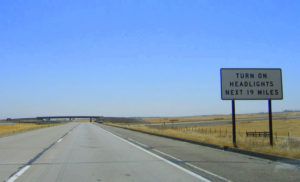
Caltrans has rolled out a plan to extend the 132 Freeway project from Dakota to Gates Roads with an advertisement in the Modesto Bee. Caltrans will hold an event before the November election to get public comments on the new phase.
In order for the new phase to proceed, voters must reject Proposition 6 in November. The proposition would repeal the 12 cent per gallon gasoline tax enacted in 2017 by the California State Legislature.
If the 12 cent per gallon tax is repealed, the newest phase of the 132 Freeway project would be killed for lack of funding, along with hundreds of other projects started but not completed statewide.
The timing of the introduction of the newest phase, just before the election, is no accident. Caltrans knows that many citizens in Stanislaus County want the freeway built, so the proposal is bait to defeat Proposition 6.
The Arguments in Favor of Proposition 6
Two basic arguments have been put forth in favor of Proposition 6. One argues that tax money presently collected is sufficient to build and maintain roads. The second claims Caltrans should be abolished due to wasteful expenditures of taxpayer money.
The first argument holds no water. Insufficient tax money is collected to build new roads and maintain existing ones. In the mid 1990’s, the Citizens’ Advisory Committee of the Stanislaus Council of Governments (then called the Stanislaus Area Association of Governments) was told by the County Public Works department that a 25 cent per gallon tax increase was needed just to maintain existing roads.
The 12 cents per gallon to be repealed by Proposition 6 is about half of the tax increase needed over 20 years ago. Thus, passage of Proposition 6 would increase the maintenance deficit and result in worse roads.
On the other hand, the contention that Caltrans wastes large amounts of taxpayer money holds a dam full of water. Tax revenue would be better spent if given directly to the counties.
The grievances against Cal trans are many; following are a few blatant examples.
The administrative cost for Caltrans projects has ballooned from 10 percent in the 1960s to over 25 percent today. Cost overruns are chronic; the Bay Bridge fiasco is a classic.

Caltrans projects waste too much land, which costs money to buy. Drive Freeway 99 between Madera and Merced. Compare the amount of land the old road used next to the railroad with the freeway project recently completed. Every freeway in the Central Valley built in the last 20 years eats up much more farmland than necessary for safety.
Instead of mitigating toxic waste dumps, Caltrans paves over them, disregarding future environmental consequences. Remediation of the dumps will be much more expensive in the future.
Caltrans does not exist to mitigate traffic congestion, only to build roads. As a result, congestion choke points exist by design throughout the state, wasting millions of gallons of gasoline and millions of hours of drivers’ time annually. As planned, the newest phase of the 132 freeway project will create a choke point at Gates Road.
Metering lights can reduce the need to add lanes to freeways; Caltrans ignores less expensive alternatives to added lane construction. Where metering lights are installed, they often are not turned on when they would be useful.
Proposition 6 is a loser for taxpayers no matter which way they vote. If Proposition 6 is passed, roads will deteriorate. If it is defeated, a dysfunctional agency will get more money to waste. Elected leaders don’t show any inclination to eliminate mediocrity.
Fallout From Higher Gas Tax: Oil Company Profiteering
Whenever California raises gasoline taxes, oil companies raise the price of gasoline more than the amount of the tax. When the legislature raised the gasoline tax by 12 cents per gallon, the oil companies immediately raised the price of gasoline by only 12 cents per gallon—while everyone was watching.
This past summer, the price of gasoline kept rising and is higher now than it was in the summer. In past years, gasoline prices dropped after Labor Day. Not this year.
Driving from California to Wyoming, one will notice at least a $1 per gallon difference in gasoline price. The spread is larger than in past years by more than the 12 cent per gallon new tax.
Citizens are getting cheated from all directions and will lose no matter how they vote. Best to buy an electric vehicle until the state figures out how to tax them.

“The first argument (tax money presently collected is sufficient to build and maintain roads) holds no water. Insufficient tax money is collected to build new roads and maintain existing ones.”
Yeah, sure. CA is the 2nd highest fuel taxed state in the nation (thank you, PA!). And if the 12 cent/ga tax is repealed? Wow, we’d fall all the way to 6th. Amazing that 44 other states plus DC can figure out how to build and maintain roads, but California can’t even consider doing it for less than the current 55 cents/ga. Well, either that, or the Left (read – the Party in power in CA) simply wants more and more and more of our money to fund their bloated bureaucracies and union cronies. And in the eyes of all good Libs, every gov’t program (except defense and police) known to man receives “insufficient funds.”
Guffaw.
Mr. Barton’s assertion that enough tax money is generated by gas tax revenue alone is inaccurate. As cars have become more fuel efficient, gas tax revenue growth has not matched the increased cost to build and maintain roads. Some gas tax money has been diverted to other modes of transportation in order to remove traffic from roads, thereby benefitting roads indirectly.
The article made the case that Caltrans plays a role in funding shortages through its inefficiencies. However, even if the agency were run perfectly, inadequate funding would still exist as the cost to build new roads in California is generally higher than other states due to higher costs for land, labor, and materials. The cost to rebuild a road is much higher than to repave. Unfortunately, many roads in California need to be rebuilt due to inadequate maintenance under Republican and Democratic administrations.
To blame the funding shortfall on liberals or conservatives is dishonest and divisive. The argument reflects negatively on the writer of such tripe.